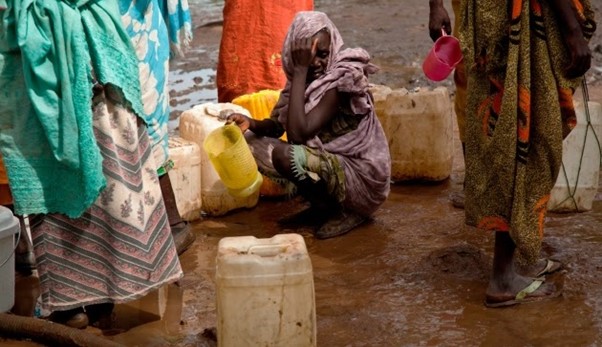Burkina Faso Records Hepatitis E Outbreak
West African country, Burkina Faso, is currently facing an outbreak of Hepatitis E, MSF has disclosed.

A hepatitis epidemic is spreading rapidly in Burkina Faso, putting a lot of people at risk, Médecins Sans Frontières (MSF) also known as Doctors Without Borders has said.
The epidemic is believed to have been brought about by the insecurity situation in the country, the organisation added.
Hepatitis E, which is spread through contaminated water has put over a million people at risk, all of who have been displaced within the country due to the insecurity crisis, resulting in scarce resources, as well as limited clean drinking water.
The disease’s symptoms are often mild but can be fatal in pregnant and breastfeeding women.
The MSF said it has so far treated 730 people in the city of Barsalogho, suffering from yellow jaundice symptoms between July 2020 and Jan. 2021.
Barama Diarra, MSF’s epidemiologist called for more efforts to be made in meeting the community needs.
“The Hepatitis E epidemic shows how difficult it is for people to get hold of clean drinking water,” Diarra said.
“Our teams have identified various risk factors. These include a shortage of latrines, leading to people defecating in the open, a complete lack of the equipment needed to store and supply homes with drinking water, and a lack of soap, meaning people don’t wash their hands often enough.”
“People also have limited access to medical care, so they often resort to traditional medicine and obtaining medicines on the street,” Diarra added.
Asides hepatitis E, he said the unsanitary water points put the people at risk of other parasitic infections and water-borne diseases including cholera and diarrhoea.
In the community of Barsalogho, only 34 per cent of the population has access to clean, quality water, MSF official noted.
Other factors putting communities at risk of other epidemics are poor housing conditions and overcrowding in camps and shelters exposed to wild animals, Diarra said.
“Improving the living conditions of these communities, through better access to water, sanitation and hygiene, is therefore crucial.”
“It is essential for preventing the spread of epidemics and waterborne diseases,” he added.
He stated that MSF teams also monitor other possible epidemics such as the outbreak of meningitis, measles, tuberculosis and COVID-19, depending on the season.
As well as harmattan related lung diseases that come with the dry and dusty winds of the season which could possibly further complicate cases of COVID-19.
Challenges In Responding To The Epidemic
Diarra highlighted that breaking the chain of transmission remains the biggest challenge in responding to the outbreak, which consists of preventive measures at three different levels.
“The first level involves measures to prevent people from getting ill in the first place. These include vaccinations and any action aimed at reducing risk factors,” he explained.
He noted that the World Health Organisation (WHO) recommends vaccinating people in contexts such as this, to reduce the consequences of an epidemic on an already vulnerable population.
But because there is a lack of large-scale production of the vaccine due to the Hepatitis E vaccine yet to be approved by Burkina Faso’s health authorities, the rollout of such a vaccine remains an unlikely immediate solution.
Asides from vaccinations, he further explained that isolating and treating high-risk individuals to prevent the spread is also paramount in combating the epidemic. This, according to him, involves communicating with members of the community to support and comply with measures put in place.
The third level, Diarra said, involves preventing infected people from experiencing complications and relapses, which could lead to long-term effects, including permanent disability.
More than 470 people were referred to health centres by community health workers to reduce transmission and were provided with outpatient treatment and advised on hygiene measures for the disease.
Curtailing The Spread
So far, MSF said it has organised awareness programmes and worked on improving access to clean water in communities.
The organisation disclosed that disease surveillance activates, promoting good practices and improving disease surveillance mechanisms have all been put in place to significantly reduce the risk of the disease spreading.
Also, the organisation also engaged in distributing jerrycans, soap kits and water purification tablets for household use, to ensure the water being used is clean as possible and proper hygiene is observed.
It said it has also collaborated with other organisations to collect and sanitise dirty jerrycans, while MSF teams have also built latrines in sites for the displaced population of the community.
“Yet, despite these concerted efforts by several organisations, a lot of work remains to be done to meet the needs of the communities in Barsalogho and elsewhere when it comes to water and sanitation,” Diarra said.
“MSF is foremost a medical organisation, so other organisations must step up to help. Long-term investment in water, sanitation and hygiene activities, as well as coordination between specialist organisations on the ground, are essential for eradicating waterborne diseases, which are one of the leading causes of diseases for which MSF treats people every year,” he added.
Support Our Journalism
There are millions of ordinary people affected by conflict in Africa whose stories are missing in the mainstream media. HumAngle is determined to tell those challenging and under-reported stories, hoping that the people impacted by these conflicts will find the safety and security they deserve.
To ensure that we continue to provide public service coverage, we have a small favour to ask you. We want you to be part of our journalistic endeavour by contributing a token to us.
Your donation will further promote a robust, free, and independent media.
Donate HereStay Closer To The Stories That Matter




